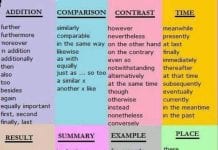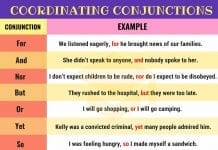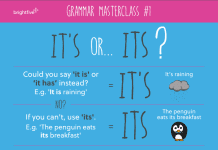Compared to many different languages, apostrophes are rather common in English. They are used in many different scenarios and have different functions depending on how they are used.
Apostrophes are this symbol (’) and are used to represent letters that have been omitted. Instead of adding in all the letters that should be there, apostrophes are used to combine words. The following are the ways that they are used.
Apostrophes for Possession
One of the most common uses for apostrophes are to show possession. If you want to show that Jack owns the car, you can say Jack’s car.
The apostrophe indicates that the object that comes after the person, animal, company, or other noun belongs to them. Apostrophes followed by s always indicate possession, and are the way to show possession for all nouns except for pronouns.
Examples include the cat’s toy, the Queen’s convoy, the company’s decision.
Apostrophes for Possession with Names and Nouns Ending in S
Singular Names
When you have a singular name that ends in s, there are two ways to show possession depending on your preference. For example, if you are talking about someone with the last name Jones, talking about their house, you can say Jones’ house or Jones’s house.
The form that you use in any context (such as writing emails, writing a book, posting something to social media, etc.) depends on the standards that you choose to use.
The apostrophe without the s at the end is more commonly used. However, using the form of the word without the apostrophe + s may be confusing because both singular and plural names do not use the extra s at the end.
Both are correct if you have a singular noun that ends in s; however, whichever form you choose should be used consistently throughout your text.
If you prefer to use Jones’, then any time you talk about something that belongs to Jones you should use Jones’ and not Jones’s.
Singular Nouns
With singular nouns, you must add the additional s at the end. You will always talk about the octopus’s friends if you are discussing a single and specific octopus.
Plural Names and Nouns
The apostrophe situation for plural nouns, however, is not the same. If you are talking about more than one person named Jones, for example, you would always use Jones’ to describe their possessions and other things.
When you discuss plural nouns ending in s, you always eliminate the last s.
Examples include Texas’ legislature and Texas’s legislature, our family’s games and our families’ games, the bus’s passengers and the buses’ passengers, Mars’ moon and Mars’s moon
Plurals of Letters
In some cases, you may need to discuss letters. An example is the expression mind your p’s and q’s, meaning you should be on your best behavior, which has two letters.
Apostrophes are used when you write about more than one letter and the letter is lowercase, which distinguishes it, as shown in the example above.
If you write the letters in uppercase, you can simply show the plural by adding a lowercase s at the end, a la Mind Your Ps and Qs.
Apostrophes in First and Last Names
In some cases, you will see names that have apostrophes. These do not indicate possession. Instead, it is simply the way that the name is spelled.
If that name comes from another language, it is likely that the name in that language has another meaning, and the spelling eliminates letters.
This is especially common in European and African last names. A famous actress with an apostrophe in her name is Lupita Nyong’o!
Note that unless you are using the possessive form of a name, such as talking about things that Edward Jones wants (Jones’s wants), you should not be using an apostrophe unless the name naturally has one, like in Nyong’o.
If you send a holiday greeting card, do not spell the plural form of the last name with an apostrophe. Say Season’s Greetings from the Joneses (correct), not Jones’s (which is like saying greetings from my instead of greetings from me).
Examples include D’Angelo or O’Malley. Most last names that have apostrophes have them after the first letter, and these first letters are often D or O.
Skype English Lesson with a native AMERICAN or BRITISH teacher ››
Apostrophes in Contractions
Another very common usage for apostrophes are in contractions. Contractions are words that are combinations of other words, syllables, and word groups. In these words, apostrophes take the place of the letters that are eliminated.
Unlike many other languages, contractions in English are very common but their use is not required. For example, I can tell my friend that it is Monday, or I can say that it’s Monday. Both of them are correct.
There are times when contractions are necessary, and there are times when contractions must not be used.
For example, you can say that I’m ready for work or that I am ready for work, but you cannot say the person that I’m is… when you are describing yourself.
You must use the person that I am is… In general, the rule for when you cannot use contractions for words that come at the end of a sentence or phrase.
The following is a list of very common contractions in English:
- I’m: I am
- Can’t: cannot
- We’ve: we have
- Should’ve: should have
- Could’ve: could have
- She’ll: she will
- He’s: he is
- They’d: they would
- Won’t: will not
- Weren’t: were not
- Wasn’t: was not
- Wouldn’t: would not
- Shouldn’t: should not
- Isn’t: is not
For the most part, contractions show less formality. They are almost always used in conversation (unless the conversation is very formal, such as a Presidential speech) and in informal writing like texts or posts on social media.
If you are writing a report, email for a coworker or boss, or anything that is more formal than interacting with your friends, it is best to eliminate contractions.
Commonly Confused Contractions
When using contractions, be careful of your usage of it’s and they’re.
It’s should only be used when you mean it is or it has. If you are trying to describe the possessive form of it, such as when talking about a pet, you should use its. Its can be correctly replaced by possessives like his or my. For example, it’s hot outside (meaning it is hot outside) but the dog likes its toy (the way that you would say the boy likes his toy).
They’re stands for they are. This is not to be confused with their (meaning the possessive form and in the same group as my or our), or there (meaning the place opposite of here).
For example, they’re waiting outside for us means that a group of people is waiting outside for us. They might be waiting there (the place) with their friends (who might also be our friends).
Apostrophes and Dates
Most dates do not use apostrophes, but if you are talking about decades, they may come into play. The use of apostrophes and dates is commonly done incorrectly.
Just like with names that end in s, you should not add an apostrophe to decades to make them plural. For example, if you are talking about the period from the year 1980-1989, you would call them the 1980s, not the 1980’s.
This is the rule if you are describing years with four numbers. However, if you just call those years The Eighties, you should write them as The ‘80s. The apostrophe goes in front of the year if you do not write out the entire 4-number year.
You write the apostrophe in front of the numbers if you describe a single year as well – so Barack Obama won the United States presidential election in ’08. This differentiates the year from the plain number.
Sometimes you will also see dates incorrectly using apostrophes, such as if someone says they have a case of the Monday’s. Unless you mean that Mondays have something (the Monday blues, perhaps?), you should not use apostrophes.
That person has a case of the Mondays, which means that they are unmotivated to get out of bed and start the week again.
Apostrophes Practice
Think you have all the rules down? Try out these examples! Should you use an apostrophe or not? Use the word in parentheses to fill in the blank – make sure to add apostrophes if necessary!
- Did you read ______ book explaining his research? (Max)
- Have you seen the ______ history exhibit at the zoo? (elephant)
- When I eat alphabet soup, I always take out the ______ to eat first. (a)
- The outcomes of ______ election could be the tiebreaker. (Kansas)
- Do you think ______ time for a change? (it is)
- I believe that the company knows ______ market. (it)
- My parents were born in the ______. (decade between 1950-1959)
- My favorite party theme is the ______. (the decade of 80-89).
- Happy birthday from the ______. (group of people names O’Brien)
Answers
- Max’s
- Elephant’s
- A’s
- Kansas’ or Kansas’s
- It’s
- Its
- 1950s
- ‘80s
- O’Briens
Skype English Lesson with a native AMERICAN or BRITISH teacher ››

























